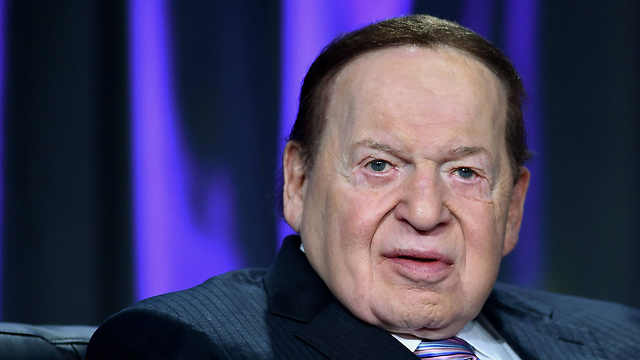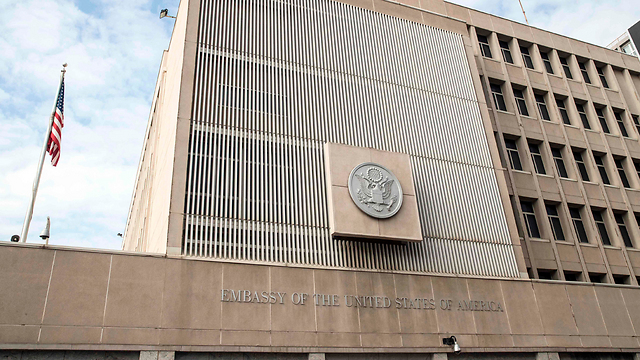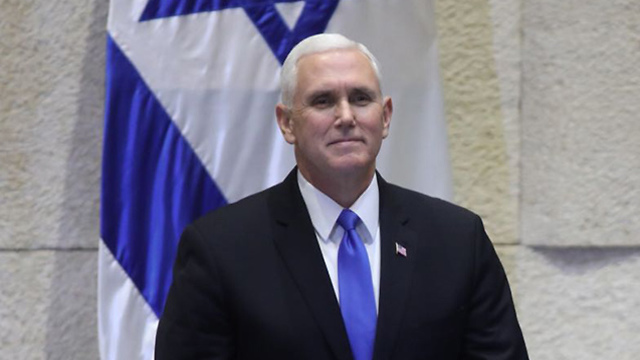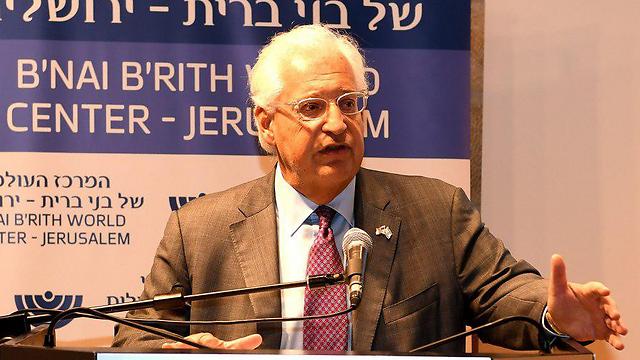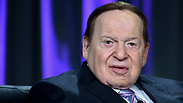
Sheldon Adelson
Photo: AFP

Adelson said to offer help pay for Jerusalem embassy move
Las Vegas casino magnate and staunch supporter of Israel Sheldon Adelson reportedly made an offer to Trump administration to partially fund embassy move from Tel Aviv to Jerusalem; State Department says it has nothing new to announce on move, 'no confirmation or details about this hypothetical proposal.'
The Trump administration is considering an offer from Republican mega-donor Sheldon Adelson to pay for at least part of a new US Embassy in Jerusalem, four US officials told The Associated Press.
Under any circumstance, letting private citizens cover the costs of an official government building would mark a significant departure from historical US practice. In the Jerusalem case, it would add yet another break with tradition after Trump's politically charged decision to move the embassy, given Adelson's longstanding affiliation with right-wing Israeli politics.
Lawyers at the State Department are looking into the legality of accepting private donations to cover some or all of the embassy costs, the administration officials said. The discussions are occurring as the new embassy clears its final bureaucratic hurdles. On Thursday, Secretary of State Rex Tillerson ended weeks of delay by signing off on a security plan for moving the embassy from Tel Aviv to the holy city, according to the officials, who weren't authorized to discuss the issue publicly and demanded anonymity.
In one possible scenario, the administration would solicit contributions not only from Adelson but potentially from other donors in the evangelical and American Jewish communities, too. One official said Adelson, a Las Vegas casino magnate and staunch supporter of Israel, had offered to pay the difference between the total cost—expected to run into the hundreds of millions of dollars—and what the administration is able to raise.
Under any circumstance, letting private citizens cover the costs of an official government building would mark a significant departure from historical US practice. In the Jerusalem case, it would add yet another break with tradition after Trump's politically charged decision to move the embassy, given Adelson's longstanding affiliation with right-wing Israeli politics.
It's not clear if there are any precedents, nor whether government lawyers would give the green light to accept Adelson's or anyone else's donations for the embassy.
Adelson's unconventional offer was made around the time Trump announced in December he would move the embassy to Jerusalem. It would address the president's stated distaste for shelling out eye-popping sums for overseas diplomatic facilities. Although Trump has promoted the Jerusalem move as fulfilling a key campaign promise, he also was outspoken last month in blasting the $1 billion price tag for a new embassy in London.
Since Trump's announcement, his administration has been sifting through options for fast-tracking the Israel embassy's relocation. Last month, Vice President Mike Pence announced during a visit to Israel that the embassy would move by the end of 2019—possibly earlier. Ambassador David Friedman, who lobbied for Trump's decision to recognize Jerusalem as Israel's capital, has advocated moving the embassy as soon as possible.
The US has looked at several possible sites. The most likely plan involves a phased approach to opening the embassy in Jerusalem's Arnona neighborhood at an existing US facility that handles consular affairs like passports and visas. The US could initially retrofit a small suite of offices in that facility to accommodate Friedman and one or two top aides such as his chief of staff.
That would allow the administration to hang an "embassy" sign over the door and formally open it, perhaps in the next few months. The ribbon could be cut in time for Israel's Independence Day, Yom Ha'atzmaut, which takes place in April.
The rest of the embassy staff would remain at first in America's current facility in Tel Aviv. Over time, the Arnona facility would be expanded to accommodate more embassy personnel. The expansion could ultimately involve an adjacent property that currently houses a home for senior citizens. It will come under US control in the next few years under a previous arrangement, officials said.
Retrofitting just a few offices could be accomplished at minimal cost. But expanding the new embassy into a full-fledged complex that houses the bulk of America's diplomatic staff in Israel would easily cost more than $500 million dollars, officials familiar with the process said. Particularly pricey are the strict security requirements for embassies that are written into US law.
It's unclear how much of the cost Adelson might be willing to cover.
The White House declined to comment. An Adelson spokesman didn't respond to multiple requests for comment.
The State Department said it had "nothing to announce" about the Jerusalem embassy move and would not "get ahead of any decisions by the secretary."
"We have no confirmation or details about this hypothetical proposal," the State Department said.
Kathy Bethany, the former cost management director for the State Department's Bureau of Overseas Building Operations, said she couldn't recall any instances of the US government accepting donations to build embassies during her tenure, which ended in 2014.
"I don't know how well that would work," Bethany said. "Would we be beholden to putting their name on the building? I've never heard of that."
The State Department's Foreign Affairs Manual lays out a process for accepting gifts from private citizens, including real estate. The process says gifts must be evaluated case-by-case through a process that includes ensuring the gift "would not give the appearance of a conflict of interest."
Adelson, who donated $5 million to Trump's inaugural committee, is one of the Republican Party's biggest donors and a major supporter of Israeli Prime Minister Benjamin Netanyahu. Adelson also finances Israel Hayom, a pro-Netanyahu newspaper that is distributed free throughout Israel.
If lawyers decide to allow donations for the Jerusalem embassy, it wouldn't be without significant political risk for Trump. The president already faces major criticism from Palestinians and others who say his decision to move the embassy to Jerusalem tipped the scaled unfairly in Israel's favor.
Mort Klein, president of the pro-Israel group Zionist Organization of America and a close associate of Adelson, said accepting donations would be ill-advised. Klein said he knew Adelson was "deeply interested" in seeing the embassy relocate to Jerusalem but was unaware that the casino mogul had offered to help pay for it himself.
"This is a government project. It's a government-run embassy," Klein said. "I don't want people to be able to say it was Jewish money."














